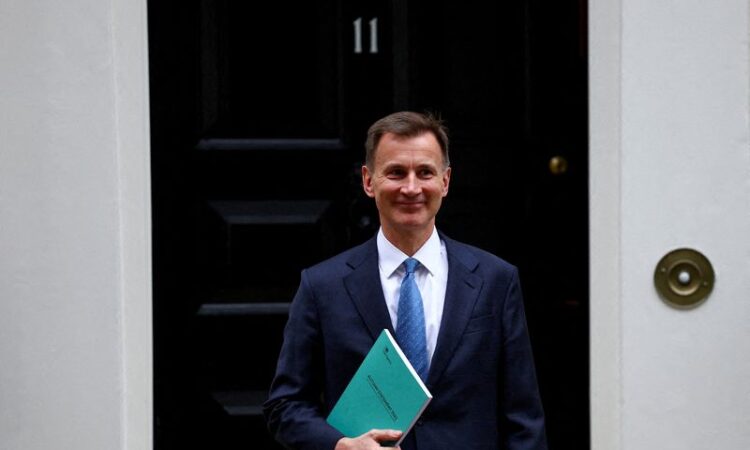
By William Schomberg and David Milliken
LONDON (Reuters) – British finance minister Jeremy Hunt sought to dampen speculation about big pre-election tax cuts in this week’s budget, saying there had been a worsening in the economic outlook, but he hinted at some help for voters.
The forecasts that underpin the budget “have gone against us,” Hunt told the Sunday Telegraph in comments that appeared designed to counter calls from within his Conservative Party for big giveaways in his annual tax-and-spend speech on Wednesday.
“We don’t have as much of a positive outlook as we had at the end of the Autumn Statement,” he said in an interview, referring to last November’s fiscal update.
“So it’s going to be a budget where we stress the progress we’ve made on bringing down inflation, but also the importance of being responsible with the country’s finances.”
He said there was “a long path” ahead to bring down Britain’s highest tax burden since World War Two.
After a shallow recession in 2023, the economy looks set to grow only slowly in 2024 while demands are mounting for spending on stretched public services and investment. Debt has soared to almost 100% of economic output after the COVID pandemic and the surge in energy prices hammered the public finances.
Nonetheless, Hunt and Prime Minister Rishi Sunak are under pressure to cut taxes to help the party’s flagging fortunes before a national election expected later this year.
Many Conservative lawmakers say the budget represents the last chance of turning around the centre-left opposition Labour Party’s 20-point lead in opinion polls.
Speaking to Sky News on Sunday, Hunt said he would like to cut taxes further possibly as soon as Wednesday.
“What you saw in the Autumn Statement was a turning point, when we cut two pence off the National Insurance rate. We will hope to make some progress on that journey, but we’re going to do so in a responsible way,” Hunt told the broadcaster.
But Hunt added: “It would be deeply un-Conservative to cut taxes in a way that increased borrowing.”
BOND MARKET WATCHING
British bond markets went into a slump 18 months ago when former Prime Minister Liz Truss and finance minister Kwasi Kwarteng promised sweeping and unfunded tax cut plans which had to be quickly reversed by Hunt.
In November, he announced some cuts to business and payroll taxes but the overall tax burden is still rising, largely because thresholds for paying many taxes have not risen in line with inflation.
Media reports have speculated about possible cuts to income tax rates, another social security cut or the relaxation of the threshold freezes.
Budget experts have said Hunt might again claim that he can afford to cut taxes now by making unrealistic promises of a squeeze on public services that are already under huge strain.
Reports have also cited a possible tightening of tax rules for so-called “non-dom” residents on their overseas earnings.
Hunt focused on another way that he could carve out a bit more fiscal wiggle room, telling BBC television on Sunday he would “rethink our whole approach to public spending.”
The finance ministry said on Saturday it planned to improve public sector productivity which would deliver up to 1.8 billion pounds ($2.3 billion) of worth of benefits annually by 2029.
Examples included the use of artificial intelligence to speed up health checks and technology to free police officers for frontline tasks.
($1 = 0.7905 pounds)
(Reporting by William Schomberg and David Milliken; Editing by Elaine Hardcastle)






